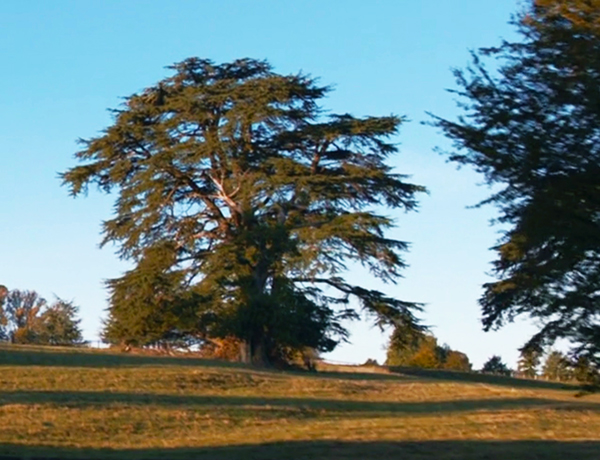
The Cedar of Lebanon, Cedrus libani, identified as Hebrew 'erez, is a majestic tree that used to grow in quantity in the forests of Lebanon. The tree is slow-growing, and individuals as old as 3,000 years are known. Tall, with branches that spread out to give it a pyramidal profile, its bluish-green needles are short and its male and female cones grow on separate branches.

As can be guessed from Solomon's lavish use of it in his construction of the Temple and his palaces recounted in the Bible (1 Ki 5:6-10), it is valued for its timber as few other trees in the region are. The timber is easily worked and its resin and oils (which is also used in perfumes) provides it with a naturally pleasing finish that scents the space in which it is used as well. Solomon, of course, was not the only one who appreciated the timber. In his father's time, Hiram had already built David a palace using the same material (2 Sam 5:11). So did those who returned to Jerusalem after the exile to rebuild the temple choose to use the cedar of Lebanon for the reconstruction (Ezr 3:7). Supplying the timber to Jerusalem meant transporting the cut trees from the forests of Lebanon to the ports of Tyre or Sidon, then floated 300km by sea to Jaffa, and then carted another 55km up the hills to Jerusalem. This simple fact often hides the immense cost involved and, therefore, the value of the project in the hearts and minds of those who ordered the use of the tree.
The beauty and majesty of the tree lends itself naturally to figurative use. In most of of these metaphorical usages, what is stressed is its gravity and dignity, unlike the thistle, who though it dared challenge the cedar to give its daughter to his son, was trampled down (2 Ki 14:9//2 Chron 25:18). Sennacherib boasts that he had cut down Lebanon's "tallest cedars" (2 Ki 19:23). God promises that in her days of redemption, "I will be like the dew to Israel; he will blossom like a lily. Like a cedar of Lebanon he will send down his roots; his young shoots will grow. His splendor will be like an olive tree, his fragrance like a cedar of Lebanon" (Hos 14:5-6). "The righteous," asserts Psm 92:12, "will flourish like a palm tree, they will grow like a cedar of Lebanon; planted in the house of the Lord, they will flourish in the courts of our God."
Like many other plant species, the cedars of Lebanon is today under threat of extinction.

©ALBERITH
160116lch